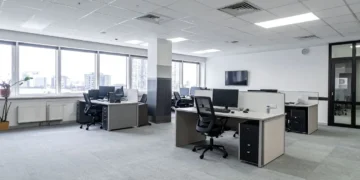- Flexible workspace company Serendipity Labs recently undertook Chapter 11 proceedings to restructure corporate level senior debt.
- In an interview with Allwork.Space, CEO John Arenas explained why the company is pursuing this method of debt restructuring.
- According to Arenas, Serendipity Labs is working with investors to emerge from Chapter 11 by early 2021.
Serendipity Labs, Inc. is optimistic that despite the challenges it is facing in court, the company will emerge successfully from Chapter 11 in the coming months.
The Chapter 11 proceedings were initially undertaken in July of 2020 to restructure corporate level senior debt using the expanded eligibility criteria of the Small Business Reorganization Act (SBRA) under the CARES Act.
The proceedings do not directly involve the Serendipity Labs operating subsidiaries or their joint venture, owned or franchised locations, which continue to operate while the parent company continues to work through the Chapter 11 process in the courts.
Why Chapter 11?
In a recent call with Allwork.Space, CEO John Arenas explained why Serendipity Labs, Inc. made the decision to pursue this method of debt restructuring and why it was needed.
“We took this action as a profitable company, only because we were unable to refinance or restructure our senior debt with our lender, Hall Financial Group, while in the midst of the first wave of the pandemic.
“The Stay at Home orders temporarily closed all Serendipity Labs locations and temporarily shut down our access to private investment markets for refinancing,” he said.
The senior level debt in question refers to a $4M loan with the Hall Financial Group from 2019 that had a maturity date of August 2020.
Under the SBRA, which went into effect in February 2020, a new subchapter (Subchapter V) was added to the United States Bankruptcy Code in an effort to make the bankruptcy process more efficient and less costly for qualifying small businesses. To be eligible, a company (the debtor) must have less than $2,725,625 in total debt with an increase in the debt limit to $7.5M as part of the CARES Act. The expansion of the debt limit to $7.5M is why Serendipity Labs, Inc. elected to use the SBRA to restructure the $4M debt to the Hall Financial Group.
The Road Leading to the Chapter 11 Case
Serendipity Labs, Inc., initially founded in 2011, has raised several rounds of financing, including a 2012 private equity round led by furniture manufacturer Steelcase.
In 2017, an $11M Series C was led by the Hall Financial Group. Real estate developer Craig Hall, the founder and chairman of the Dallas-based group, joined the Serendipity Labs, Inc. board at that time. The developer also partnered with Serendipity Labs to open the company’s first Dallas location in KPMG Plaza at HALL Arts.
After taking out the additional $4M loan from Hall Financial Group in 2019 to support upcoming expansion plans, the goal was to refinance the loan in early 2020. Unfortunately, negotiations to complete the refinance were not completed prior to the COVID-19 pandemic hitting the world in March of 2020. Location closures due to lockdowns resulting from the pandemic adversely affected Serendipity Labs, Inc.’s ability to secure the necessary investment to refinance or restructure its debt obligation to Hall Financial Group before its August 2020 maturity date.
According to Arenas, after failing to secure additional investment, the company went back to Hall Financial Group requesting an extension on the maturity date or restructuring of the loan. At this point, Craig Hall was no longer on the Board of Serendipity Labs, Inc. and the company received no answer to their request. Prior to the loan maturity date, Serendipity Labs, Inc. received a non-monetary default notice from Hall Financial Group.
Concerned about fulfilling the debt obligation, Serendipity Labs, Inc., with approval from its Board, chose to proceed with restructuring its debt under the SBRA Subchapter V.
Business Growth Amid More Challenges
Despite the decision to have Serendipity Labs, Inc. proceed with debt restructuring, the Serendipity Labs brand continues to successfully open new locations. These locations include Charleston, St. Louis, and Memphis, as well as planned openings in Houston, Buffalo, and North Dallas. “Our pipeline of corporate customers reflects the strongest demand for flexible workplace alternatives we have seen in our 8 years of operation,” Arenas shared in a letter sent recently to Serendipity Labs partners and licensees.
Under Subchapter V, it is possible for a company to conclude the bankruptcy process in just a few months, which is much more expeditious than a traditional Chapter 11 bankruptcy case.
Unfortunately, Serendipity Labs, Inc. faced an additional setback in the process when the Hall Financial Group filed a challenge in October 2020 to the company’s election to proceed as a small business debtor under Subchapter V. The basis for the challenge came from the fact that Steelcase, which through its investment in Serendipity Labs, Inc. owns approximately 27.7% of the company’s shares in total, is a publicly traded company itself.
Despite only owning 6.5% of the shares that were eligible to vote on the bankruptcy election, it was argued that since Steelcase owns more than 20% of the total shares, that Serendipity Labs, Inc. should be considered an “affiliate” of a public company under SEC rules and thus not eligible for the small business benefits of Subchapter V.
In a ruling that was a surprise to Arenas, the court agreed. A summary article of the case published in the National Law Review explained that, “Based on the plain meaning of the statute and implications of interpreting it otherwise, the court found that “voting shares” are measured by percentage of total voting shares and revoked the Debtor’s Subchapter V election.”
As a result of the ruling, Serendipity Labs could no longer proceed with bankruptcy under Subchapter V and instead had to follow a more stringent process as a traditional Chapter 11 case. In response to the ruling, Arenas said, “We had arranged an investment with a plan sponsor that would have met the requirements of Subchapter 5 for repayment of creditors, but we have had to restart this effort due to the new requirements of a Chapter 11. This will mean a longer and more complex path to emerging successfully from Chapter 11.”
Creating the Back-up Plan
A traditional Chapter 11 bankruptcy case is a much more complicated process with a higher bar for companies to emerge from it. To best position themselves for success, Serendipity Labs, Inc. raised $1.1M from Bay Point Capital Partners to support the administration and legal costs of the continued process while still operating the company on a neutral to cash flow positive basis.
In what Arenas called a “Plan B”, they also proposed a formal process for optimizing the return to creditors, in case they elect to proceed with a sale of the company next year as an alternative to filing a plan of reorganization. As this requires a court supervised and transparent process, Serendipity Labs, Inc. filed details of an asset purchase agreement and auction as part of a 363 sale procedure for consideration by the court.
Details surrounding this proposed asset purchase agreement and auction proceedings were the focus of a recent article on the status of the company’s Chapter 11 filing.
Moving Forward to Emerge from Chapter 11
Meanwhile, Serendipity Labs, Inc. is still working with investors to emerge from Chapter 11 by early 2021 and is continuing to push the business forward.
In response to increased and changing customer demand, for example, the company has launched several new offerings over the past 6 months. These new products include a hub and spoke focused team suites product called TeamHub™ Private, a live streaming meeting platform called LINC™ Hybrid Meeting, and their most recently announced Worktopia™, designed to allow anyone to build an ideal, on-demand workplace that matches their workstyle; starting with a safe, private office by the day.
According to Arenas, Serendipity Labs, “expect[s] to continue to fulfill obligations to our partners, licensees and members and operate as we have been. We continue to open new locations and remain convinced that the distribution of vaccines and a return to work will initiate an era of accelerated demand for flexible, outsourced workplace offerings like ours, and that this will drive the value of Serendipity up from the current, pandemic-suppressed levels.”



 Dr. Gleb Tsipursky – The Office Whisperer
Dr. Gleb Tsipursky – The Office Whisperer Nirit Cohen – WorkFutures
Nirit Cohen – WorkFutures Angela Howard – Culture Expert
Angela Howard – Culture Expert Drew Jones – Design & Innovation
Drew Jones – Design & Innovation Jonathan Price – CRE & Flex Expert
Jonathan Price – CRE & Flex Expert












